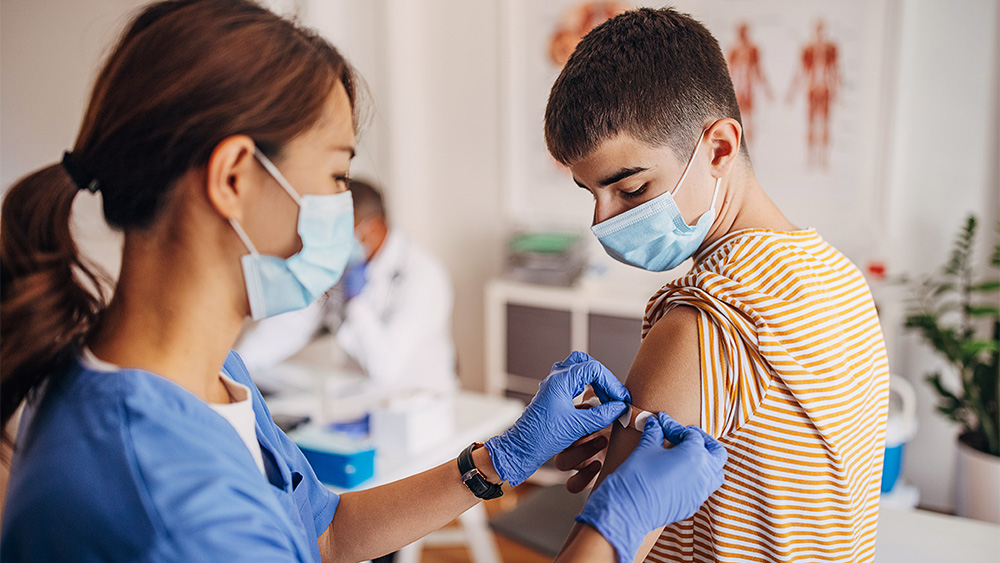
Research supported by NIH has found that when vaccinated with an adult dose of any COVID-19 vaccine, children had a stronger antibody response than adults did.

Research supported by NIH has found that when vaccinated with an adult dose of any COVID-19 vaccine, children had a stronger antibody response than adults did.
What you need to know
Our organs and body systems continue to grow and develop through childhood. This includes the immune system, which grows and learns based on what it encounters. Children may have different immune responses to a virus or bacteria than adults do, in part because their young immune systems have not met as many different viruses and other invaders.
The Pfizer-BioNTech and Moderna mRNA COVID-19 vaccines are both available under emergency use authorization (EUA) for children over 6 months of age. This means that the benefits of vaccination outweigh any risks, and there is a substantial amount of data that shows the vaccines are safe and effective for children. But it is not clear whether the vaccine doses given to children are as effective as they could be and whether children respond to vaccination the same way that adults do.
In a small study supported by the National Cancer Institute; the National Heart, Lung, and Blood Institute; the National Institute of Allergy and Infectious Diseases; and the National Institute on Minority Health and Health Disparities, researchers examined children after their COVID-19 vaccinations to learn more about their immune response.
What did the researchers do?
The researchers examined blood samples from children who were participating in a clinical trial of the original Moderna COVID-19 vaccine. The samples came from children ages 6 to 11 before vaccination, about one month after their first vaccination, and one month after their second shot. This group included 12 children who were given the adult dose of 100 micrograms and 12 other children who received 50 micrograms, which was ultimately decided on as the right dose for children ages 6 to 11.
Samples were obtained from nine children who had previously had COVID-19, six children with multisystem inflammatory syndrome in children (MIS-C), and 33 adults. The researchers ran an array of tests on each sample, including tests with different SARS-CoV-2 variants, and used computers to look for patterns in the data.
What did they learn?
All of the vaccinated children made antibodies against SARS-CoV-2. At the same dose as adults, children had a stronger antibody response than adults did. Children who received the adult dose also had a stronger antibody reaction than children who had tested positive for COVID-19 or children with acute MIS-C did.
At the pediatric dose of 50 micrograms, there was more variation in children’s immune response. Children who received the 100-microgram dose were more likely than children who received the pediatric dose to have antibodies able to bind to different variants of the SARS-CoV-2 virus, including Omicron.
Antibodies that bind to and neutralize an invader are only one part of the immune system. At the adult vaccine dose, children showed a greater tendency than adults to invoke another part of the immune system, in which other cells come in to engulf and destroy the virus. This alternate response is thought to be why vaccines are still effective at preventing severe COVID-19, even though they do not necessarily stop SARS-CoV-2 infection.
Why is this research important?
This research helps show how children respond to vaccination and infection with the SARS-CoV-2 virus. The findings suggest that giving children a higher dose of a COVID-19 mRNA vaccine might allow them to recruit more of their immune system to fight an infection.
Future research can examine whether the immune response generated by these vaccines is long-lasting, how well that response protects against SARS-CoV-2 variants, and whether children will need to receive booster shots.
Where can I go to learn more?
Antibody Response Affects COVID-19 Outcomes in Kids and Adults
-
Former NIH Director Dr. Francis Collins wrote about antibody response in children and adults.
When Kids Get Sick After COVID-19 Goes Away
-
NIH is following children with MIS-C for five years to understand this COVID-related illness.
Breaking Down the Body’s Response to SARS-CoV-2
-
This work was conducted as part of SeroNet, a group of researchers who are studying the immune response to SARS-CoV-2 and the COVID-19 vaccines.
Sources
Bartsch, Y. C., St Denis, K. J., Kaplonek, P., Kang, J., Lam, E. C., Burns, M. D., Farkas, E. J., Davis, J. P., Boribong, B. P., Edlow, A. G., Fasano, A., Shreffler, W. G., Zavadska, D., Johnson, M., Goldblatt, D., Balazs, A. B., Yonker, L. M., & Alter, G. (2022). SARS-CoV-2 mRNA vaccination elicits robust antibody responses in children. Science Translational Medicine, eabn9237. Advance online publication. https://doi.org/10.1126/scitranslmed.abn9237

News and Stories
Read stories about the efforts underway to prevent, detect, and treat COVID-19 and its effects on our health.
 An official website of the United States government
An official website of the United States government

